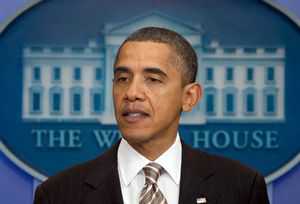Bruce Fein
On April 24, 2009–Armenian Remembrance Day– President Barack Obama issued a statement “remember[ing] the 1.5 million Armenian [deaths] in the final days of the Ottoman Empire.” The President stumbled.
To paraphrase Mark Twain, there are three kinds of lies: lies, damn lies, and the number of Armenians who are claimed by Armenians and their echo chambers to have died in an alleged World War I genocide. Almost a century later, the number of deaths they assert oscillates between 1.5-2 million. But the best contemporary estimates by Armenians or their sympathizers were 300,000-750,000 (compared with 2.4 million Ottoman Muslim deaths in Anatolia). Further, not a single one of those deaths necessarily falls within the definition of genocide in the authoritative Genocide Convention of 1948. It requires proof that the accused was responsible for the physical destruction of a group in whole or in substantial part specifically because of their race, nationality, religion, or ethnicity. A political or military motivation for a death falls outside the definition.
Immediately after the war, when events and memories were fresh, Armenians had no incentive to concoct high casualty figures or genocidal motivations for their deaths. Their objective was statehood. Armenians were encouraged by the self-determination concept in President Woodrow Wilson’s Fourteen Points, (while conveniently forgetting that they were a minority in Eastern Anatolia where they hoped to found a new nation). Armenian leaders pointed to their military contribution to defeating the Ottomans and population figures that would sustain an Armenian nation.
Boghus Nubar, then Head of the Armenian Delegation to the Paris Peace Conference (1919), wrote to the French Foreign Minister Stephen Pichon: “The Armenians have been, since the beginning of the war, de facto belligerents, as you yourself have acknowledged, since they have fought alongside the Allies on all fronts, enduring heavy sacrifices and great suffering for the sake of their unshakable attachment to the cause of the Entente….” Nubar had earlier written to the Foreign Minister on October 29, 1918, that Armenians had earned their independence: “We have fought for it. We have poured out our blood for it without stint. Our people played a gallant part in the armies that won the victory.”
When their quest for statehood shipwrecked on the Treaty of Lausanne and annexation by the Soviet Union in 1921, Armenians revised their soundtrack to endorse a contrived genocide thesis. It seeks a “pound of flesh” from the Republic of Turkey in the form of recognition, reparations, and boundary changes. To make their case more convincing, Armenians hiked the number of deaths. They also altered their story line from having died as belligerents against the Turks to having perished like unarmed helpless lambs.
Vahan Vardapet, an Armenian cleric, estimated a prewar Ottoman Armenian population of 1.26 million. At the Peace Conference, Armenian leader Nubar stated that 280,000 remained in the Empire and 700,000 had emigrated elsewhere. Accepting those Armenian figures, the number of dead would be 280,000. George Montgomery of the Armenia-American Society estimated a prewar Armenian population of 1.4-1.6 million, and a casualty figure of 500,000 or less. Armenian Van Cardashian, in testimony before the Senate Foreign Relations Committee in 1919, placed the number of Armenian dead at 750,000, i.e., a prewar population of 1.5 million and a post-war figure of 750,000.
After statehood was lost, Armenians turned to their genocide playbook which exploited Christian bigotries and contempt for Ottoman Muslims. They remembered earlier successful anti-Ottoman propaganda. United States Ambassador to the Ottoman Empire during the war, Henry Morganthau, was openly racist and devoted to propaganda. On November 26, 1917, Morgenthau confessed in a letter to President Wilson that he intended to write a book vilifying Turks and Germans to, “win a victory for the war policy of the government.” In his biography, “Ambassador Morgenthau’s Story,” Morgenthau betrays his racist hatred toward Turks (“humanity and civilization never for a moment enters their mind”) and unconditional admiration for Armenians (“They are so superior to the Turks intellectually and morally.”).
British Prime Minister Gladstone’s histrionic figure of 60,000 Bulgarian Christians slaughtered in 1876 captured the imagination of the west. The true figure later provided by a British Ambassador was 3,500–including Turks who were first slain by the Christians.
From 280,000-750,000, Armenians initially raised their death count to 800,000 to test the credibility waters. It passed muster with uninformed politicians easily influenced by campaign contributions and voting clout. Armenians then jumped the number to 1.5 million, and then 1.8 million by Armenian historian Kevork Aslan. For the last decades, an Armenian majority seems to have settled on the 1.5 million death plateau–which still exceeds their contemporary estimates by 200 to 500 percent. They are now testing the waters at 2.5-3 million killed as their chances for a congressional genocide resolution recede. It speaks volumes that champions of the inflated death figures have no explanation for why Armenians on the scene would have erred. Think of the absurdity of discarding the current death count of Afghan civilians in the United States-Afghan war in favor of a number deduced in the year 2109!
Armenians have a genuine tale of woe. It largely overlaps with the tale of tragedy and suffering that can be told by Ottoman Muslims during the war years: 2.4 million deaths in Anatolia, ethnic cleansing, starvation, malnutrition, untreated epidemics, and traumatic privations of war under a decrepit and collapsing Empire.
Unskewed historical truth is the antechamber of Turkish-Armenian reconciliation. That is why the Government of Turkey has proposed an international commission of impartial and independent experts with access to all relevant archives to determine the number and characterization of World War I deaths. Armenians are balking because they are skeptical of their own figures and accusations.






